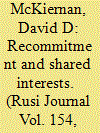|
|
|
Sort Order |
|
|
|
Items / Page
|
|
|
|
|
|
|
| Srl | Item |
| 1 |
ID:
087910


|
|
|
|
|
| Publication |
2009.
|
| Summary/Abstract |
The International Security Assistance Force (ISAF) has been engaged in Afghanistan for over seven years. The perception of a growing insurgency has caused some commentators and nations to question the mission, challenge the financial costs or become weary of the fight. Others believe the success of ISAF's strategy in Afghanistan is not only possible, but likely with the steadfast military, political and economic support of NATO and the international community. The Commander of ISAF, General McKiernan, argues for a recommitment by NATO to the goals of the mission, an acceptance of long-term responsibility, and a realisation that the solution requires more than just military means to secure the region.
|
|
|
|
|
|
|
|
|
|
|
|
|
|
|
|
| 2 |
ID:
123981


|
|
|
|
|
| Publication |
2013.
|
| Summary/Abstract |
The United States intervention in Afghanistan since 2001 has brought progress in some areas, but the conflict has expanded, the Taliban remains powerful, and misgovernance and predation are widespread. Afghan national security forces - the linchpin of the coalition's exit strategy - offer no guarantee of future stability.
Many accounts describe the mistakes that led to this predicament. This article attempts to explain why these mistakes were made by examining their underlying or structural causes. Based on 51 interviews with officials and experts, it identifies major US policy-making errors with respect to state-building, military activities and diplomacy. It argues that there are four principal underlying causes of such errors, relating to organizations, leadership and strategic thinking, psychology, and domestic politics.
It finds that there were severe shortcomings in the acquisition and processing of information and a lack of institutional self-evaluation; civilian and military leaders made major strategic misjudgements in mistaking the strategy for the goal, overestimating the efficacy of military force or resources, and drawing false lessons from history or analogous cases such as Iraq; leaders were predisposed to overconfidence and oversimplification; and, at the highest level, policies were distorted by domestic politics.
The article contends that the cumulative impact of these shortcomings was sufficient to seriously disrupt the functioning of the foreign policy-making system. It argues that action is required to improve US information gathering and assessment, systematize institutional self-evaluation, build regional expertise, establish mechanisms to understand the motivations and perceptions of other actors, and increase awareness of decision-makers' cognitive flaws and biases.
|
|
|
|
|
|
|
|
|
|
|
|
|
|
|
|
|
|
|
|
|